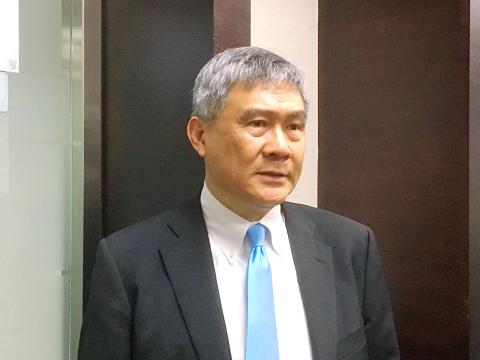Delta Electronics Inc (台達電), the nation’s leading power and thermal solutions provider, remains cautiously optimistic about the second half of the year, chairman Yancey Hai (海英俊) said at the company’s annual general meeting yesterday, citing market uncertainties.
While the second half traditionally brings in more revenue, Hai said that the unresolved trade conflict between the US and China has caused market volatility, especially with the recent US trade restrictions on Huawei Technologies Co (華為).
Delta provides fans and passive components to Huawei, contributing less than 1 percent to the company’s revenue, Hai said.

Photo: Chen Jou-chin, Taipei Times
The overall supply chain has been affected by the moves against Huawei and more complications could arise as the industry looks to rebuild the supply chain, he said.
Hai, alluding to the black swan theory, discussed the likelihood that US President Donald Trump’s administration would introduce tariffs on another US$300 billion in Chinese goods, warning that end demand would suffer the repercussions.
Delta reported revenue of NT$24.56 billion (US$781.27 million) for last month, an increase of 23.99 percent from a year earlier, with the power electronics segment accounting for 50 percent of overall sales, followed by the infrastructure segment with 36 percent and the automation segment with 14 percent.
Cumulative revenue grew 14.77 percent annually to NT$102.09 billion in the first five months of the year, it said.
Delta predicts that 5 to 7 percent of its revenue has been affected by the ongoing US-China trade tensions, with the networks and communications segment suffering the most.
To circumvent US tariffs, Delta has moved a majority of its advanced production lines for its networks and communications business to Taiwan, Hai said.
The company has also expanded, setting up production lines in Thailand, India and Slovakia, he added.
Delta in April acquired a 63.78 percent stake in Delta Electronics (Thailand) PCL (泰達電).
At yesterday’s meeting, shareholders approved a proposal to distribute a cash dividend of NT$5 per share, which would represent a payout ratio of 71.43 percent based on last year’s earnings per share of NT$7 and imply a dividend yield of 3.3 percent based on the stock’s closing price of NT$151.5 in Taipei trading yesterday.

With an approval rating of just two percent, Peruvian President Dina Boluarte might be the world’s most unpopular leader, according to pollsters. Protests greeted her rise to power 29 months ago, and have marked her entire term — joined by assorted scandals, investigations, controversies and a surge in gang violence. The 63-year-old is the target of a dozen probes, including for her alleged failure to declare gifts of luxury jewels and watches, a scandal inevitably dubbed “Rolexgate.” She is also under the microscope for a two-week undeclared absence for nose surgery — which she insists was medical, not cosmetic — and is

CAUTIOUS RECOVERY: While the manufacturing sector returned to growth amid the US-China trade truce, firms remain wary as uncertainty clouds the outlook, the CIER said The local manufacturing sector returned to expansion last month, as the official purchasing managers’ index (PMI) rose 2.1 points to 51.0, driven by a temporary easing in US-China trade tensions, the Chung-Hua Institution for Economic Research (CIER, 中華經濟研究院) said yesterday. The PMI gauges the health of the manufacturing industry, with readings above 50 indicating expansion and those below 50 signaling contraction. “Firms are not as pessimistic as they were in April, but they remain far from optimistic,” CIER president Lien Hsien-ming (連賢明) said at a news conference. The full impact of US tariff decisions is unlikely to become clear until later this month

GROWING CONCERN: Some senior Trump administration officials opposed the UAE expansion over fears that another TSMC project could jeopardize its US investment Taiwan Semiconductor Manufacturing Co (TSMC, 台積電) is evaluating building an advanced production facility in the United Arab Emirates (UAE) and has discussed the possibility with officials in US President Donald Trump’s administration, people familiar with the matter said, in a potentially major bet on the Middle East that would only come to fruition with Washington’s approval. The company has had multiple meetings in the past few months with US Special Envoy to the Middle East Steve Witkoff and officials from MGX, an influential investment vehicle overseen by the UAE president’s brother, the people said. The conversations are a continuation of talks that

CHIP DUTIES: TSMC said it voiced its concerns to Washington about tariffs, telling the US commerce department that it wants ‘fair treatment’ to protect its competitiveness Taiwan Semiconductor Manufacturing Co (TSMC, 台積電) yesterday reiterated robust business prospects for this year as strong artificial intelligence (AI) chip demand from Nvidia Corp and other customers would absorb the impacts of US tariffs. “The impact of tariffs would be indirect, as the custom tax is the importers’ responsibility, not the exporters,” TSMC chairman and chief executive officer C.C. Wei (魏哲家) said at the chipmaker’s annual shareholders’ meeting in Hsinchu City. TSMC’s business could be affected if people become reluctant to buy electronics due to inflated prices, Wei said. In addition, the chipmaker has voiced its concern to the US Department of Commerce